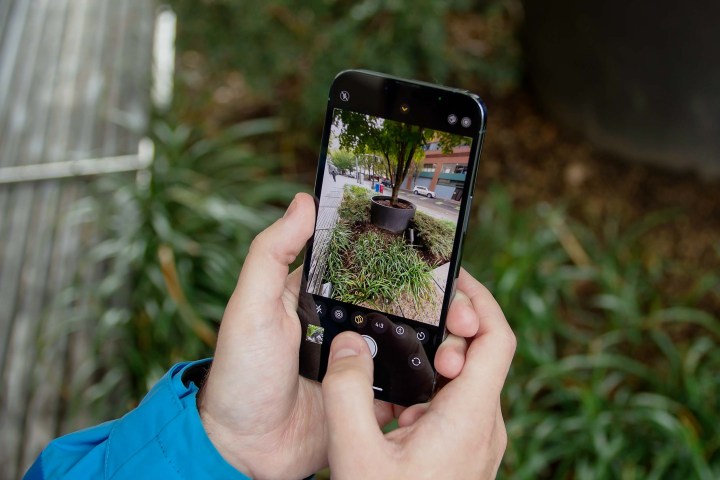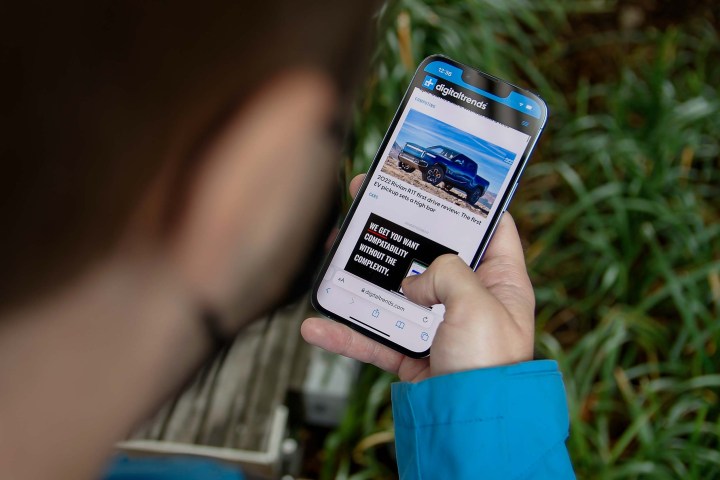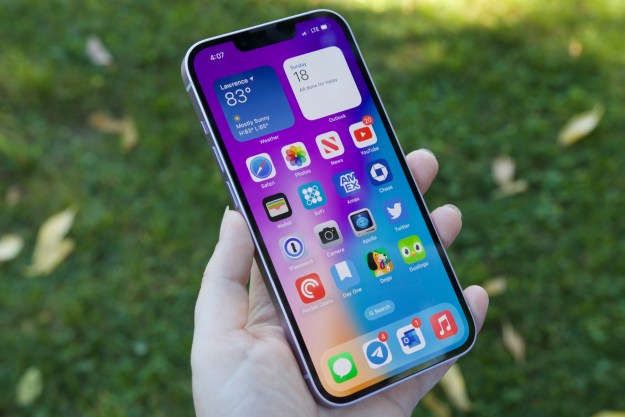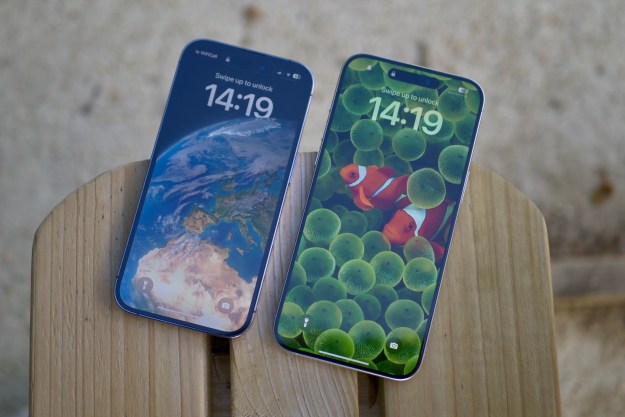A new iPhone is a beautiful thing, and this year it’s hard to get more beautiful than the recently released iPhone 13 Pro. The top-tier iPhone of 2021 includes a similar design to the iPhone 12 Pro, but with a slightly thinner notch. Inside though, there have been more significant changes. There’s a larger battery, newly upgraded specs, and some heavily tweaked cameras. Really, when it comes down to the iPhone 13 Pro vs. iPhone 12 Pro, the newer device seems to have it sewn up.
But we’re not here to compare old with new — we’re here to compare two contemporary rivals. The Samsung Galaxy S21 Plus is the midsized option in Samsung’s 2021 lineup. With flagship specs, a state-of-the-art camera suite, and a gorgeously modern design, Samsung’s Plus-sized smartphone is a worthy competitor for Apple’s latest. But which one of the two is the better smartphone? We put them head-to-head to find out.
Specs
| iPhone 13 Pro | Samsung Galaxy S21 Plus | |
| Size | 146.7 x 71.5 x 7.7mm (5.78 x 2.81 x 0.30 inches) | 75.6 x 161.5 x 7.8mm (3 x 6.4 x 0.31 inches) |
| Weight | 204 grams (7.2 ounces) | 202 grams (7.2 ounces) |
| Screen size | 6.1-inch Super Retina XDR OLED | 6.7-inch FHD+ Dynamic AMOLED |
| Screen resolution | 2532 x 1170 pixels (460 ppi) | 2400 x 1080 pixels (394 ppi) |
| Operating system | iOS 15 | Android 11 with One UI 3.1 |
| Storage | 128GB, 256GB, 512GB, 1TB | 128GB, 256GB |
| MicroSD card slot | No | No |
| Processor | Apple A15 Bionic | Qualcomm Snapdragon 888 (Exynos 2100 outside the U.S.) |
| RAM | 6GB | 8GB |
| Camera | Triple lens 12-megapixel wide, 12MP ultrawide, and 12MP telephoto rear, 12MP front | Triple lens 64MP wide, 12MP ultrawide, and 12MP telephoto rear, 10MP front |
| Video | 4K at up to 60 fps, 1080p at 120 fps | 8K at up to 30 fps, 4K at up to 60 fps, 1080p at 240 fps |
| Bluetooth version | Bluetooth 5.1 | Bluetooth 5.1 |
| Ports | Lightning | USB-C |
| Fingerprint sensor | No, FaceID instead | Yes (in-display ultrasonic) |
| Water resistance | IP68 | IP68 |
| Battery | 3,125mAh
20W wired charging (no charger included in the box) 15W MagSafe charging 7.5W wireless charging |
4,800mAh
25W wired charging (no charger included in the box) 15W wireless charging |
| App marketplace | Apple App Store | Google Play Store |
| Network support | All major carriers | All major carriers |
| Colors | Graphite, Gold, Silver, Sierra Blue | Phantom Silver, Phantom Black, Phantom Violet (Phantom Gold and Phantom Red made-to-order) |
| Price | Starting at $999 | Starting at $1,000 |
| Buy from | Apple | Samsung |
| Review score | 4.5 out of 5 stars | 3.5 out of 5 stars |
Design, display, and durability
- 1. Apple iPhone 13 Pro
- 2. Samsung Galaxy S21 Plus
It’s getting harder and harder to decide between phones based on their looks because, honestly, so many phones just look great these days. This is definitely the case where these two phones are concerned, but they do look very different. The Samsung Galaxy S21 Plus is smooth and sleek, with a near-borderless bezel around the large display, broken only by a single punch-hole for the selfie camera. The iPhone 13 Pro is very different looking. It has steep sides, reminiscent of the iPhone 5S, and the display is broken at the top by a notch housing the selfie camera and forward-facing sensors. This notch is narrower than previous iPhone generations, but it is slightly deeper and doesn’t really add much additional screen as a result.
Both of these phones have stunning OLED displays too, so you’ll get deep colors and inky blacks either way. The iPhone’s screen is sharper, thanks to the smaller display size, but the difference isn’t massive unless you’re right up against both.
There’s a larger gulf in durability though. While we recommend you buy a case for both the S21 Plus and the iPhone 13 Pro, the iPhone is a fair amount stronger than the Samsung phone. It’s made from stainless steel, rather than aluminum, and the strengthened Ceramic Shield technology in the glass actually does make a difference in the iPhone’s durability.
It’s a tough category to call. We think the Samsung is slightly better looking in terms of design, but the iPhone wins points for its durability. This is a tie.
Winner: Tie
Performance, battery life, and charging

It should come as no surprise that these phones have the latest and greatest technological advancements. The Galaxy S21 Plus has the Qualcomm Snapdragon 888, which is more than powerful enough to keep your flagship phone churning through the top 3D games and swapping between apps for the next few years at least. The iPhone’s A15 Bionic processor is at a similar level of power, and may well be slightly more powerful, but the difference is unlikely to be noticed in anything but benchmarking software.
Well then, what about the battery life? A long-lasting smartphone is preferable to one that runs out in the middle of the day, and the iPhone 13 Pro has proven to have a strong battery, with a single charge being able to go for two days at a stretch. The S21 Plus’s battery lasts over a day, but it’s not quite as impressive as the iPhone 13 Pro’s. Still, both are long-lasting, so you shouldn’t have any worries with battery anxiety.
The iPhone 13 Pro is technically the stronger of the two, but the difference is slight enough that we can’t put this as anything but a draw.
Winner: Tie
Cameras

The Galaxy S21 Plus has a main 64-megapixel camera, a 12MP ultrawide camera, a 12MP telephoto with a 3x optical zoom, and a 10MP selfie lens around the front. It’s an impressive-looking setup on paper, and it takes good pictures across the board — but the competition is generally taking excellent shots, and when you add consistency problems between the different lenses, it leaves the S21 Plus in an awkward spot.
The iPhone 13 Pro has a triple-lens setup, with a 12MP main wide-angle lens, a 12MP ultra-wide lens, and a 12MP telephoto lens. It tends to go without saying that the latest iPhone’s camera is going to be the one to beat, and that’s the case here. It produced excellent shots throughout our review period. One Samsung flagship is good enough to stand up against Apple’s latest, but it’s the S21 Ultra, which has a much stronger camera suite than the S21 Plus.
While the S21 Plus’ camera is by no means disappointing, it’s not good enough to face up against the iPhone 13 Pro’s excellent cameras.
Winner: Apple iPhone 13 Pro
Software and updates

Comparing iOS and Android is a little like comparing apples and oranges — there are definitely similarities, but ultimately, they’re two very different things. That’s even the case when you consider Samsung uses its own Android skin, OneUI. With that said, the last few years have seen the two operating systems coming closer than they ever have before, and jumping between the two is no longer the quantum leap it once was. But it’s still a huge personal choice, and there’s little we can do to definitively state once and for all which is better.
But that’s not true when we take a close look at updates. Since Apple is the sole arbiter of iOS, it can roll updates out on the day of release and make sure it hits the devices it wants to. Not so with Android. After Google pushes out an update, it goes to chip manufacturers, then phone manufacturers. That process adds a significant delay onto updates, and while the situation has gotten a lot better, Apple definitely still has a big edge here.
Winner: Apple iPhone 13 Pro
Special features

We’ll start with the big one: Both phones have 5G, which is a relief, given how quickly the next generation of cell network is spreading. Otherwise, both also have their respective digital assistants — though the Google Assistant on Android is arguably more useful and skilled than iOS’s Siri. The iPhone also has access to AR-powered Animoji and Memoji, something that Samsung does struggle to match with its less impressive AR emoji.
But the S21 Plus is definitely the stronger here. Samsung is nothing if not experimental, and the S-series has been rammed full of features over the years. While Gear VR has been consigned to the dustbin of history, there’s still a lot to offer here. You’ve got the additional help of the Bixby digital assistant (which can directly alter settings on your Samsung phone), the DeX desktop mode, and a cool under-display fingerprint scanner. It’s a pretty clear win for the Samsung phone.
Winner: Samsung Galaxy S21 Plus
Price and availability
The Apple iPhone 13 Pro is currently available from Apple, and prices start from $999. It’ll be available from pretty much anywhere you can buy smartphones, and it’ll work with any of the major carriers as well.
The Samsung Galaxy S21 Plus is also available, and prices start from $1,000. Like the iPhone, it’s available pretty much anywhere and on every carrier to boot.
Overall winner: Apple iPhone 13 Pro

The Apple iPhone 13 Pro is the victor here, and deservedly so. It’s beautiful, powerful, and capable of everything you want your smartphone to do in 2021. The camera is a triumph, the two-day battery life exceeds expectations, and the 120Hz display means using the iPhone is a pleasure in itself. By no means is this is a jab against the Galaxy S21 Plus though — Samsung’s midsized flagship phone is still a great phone, with a lot to recommend it. It’s just, on this day, the iPhone 13 Pro is the stronger of the two.
So, on to recommendations. Using the Samsung Galaxy S21 Plus and wondering whether to upgrade to the iPhone 13 Pro? We’d say to hold off for now. The iPhone 13 Pro may technically be superior, but is it worth going through the rigamarole of upgrading and setting up a new phone just to get a slightly better camera and battery? We wouldn’t say so, so unless you’re dying to be back on iOS, don’t bother upgrading from the S21 Plus.
But choosing between these two phones? Then your choice should always (unless you’re a massive Android fan) be the iPhone 13 Pro.
Editors' Recommendations
- iPhone 16: news, rumored price, release date, and more
- The best iPhone 15 Pro Max cases in 2024: the 20 best ones
- This is our best look yet at the iPhone 16’s big design changes
- Does the iPhone 15 have an overheating problem? Here’s what we know
- iPhone 16 buyers may be treated to slimmer bezels and bigger screens




